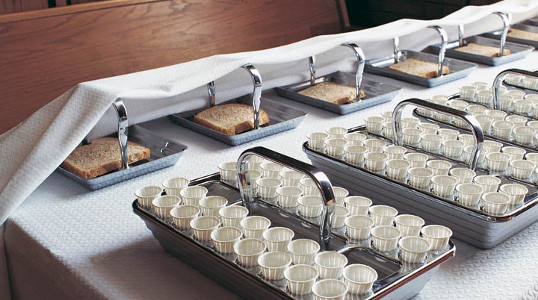Bill Jones Eulogy
Eulogy I gave November 4th, 2017 at my father's memorial service after his death October 25th, 2017 ...
The weekly sacrament ritual is the focal point in LDS sabbath worship. In it we renew our baptismal covenants with Christ. These covenants include promises to God, to ourselves, and to others. The ritual also has layers of meaning in how it is prepared, blessed, and passed by the Aaronic priesthood holders in the ward. In LDS sabbath meetings, the priesthood generally only passes the sacrament between pews. Once the sacrament is passed to a pew, the people sitting in the pew pass it to each other before passing it back to a priesthood holder to pass to the next pew. Often when Mormons speak of passing the sacrament, they are only referring to the passing that goes on from the sacrament table to the outer edge of the pews. But if you pay attention, you’ll see that there’s an even more powerful and intimate meaning in how the sacrament is passed within the pews. This is what happened when I saw my daughter pass the sacrament to me.
The act of passing the sacrament is profound. The sacrament represents the emblems of Christ: His blood and body shed for us. It becomes a physical representation of our baptismal covenants and the atonement. The act of passing it, offering it, to someone is deeply symbolic. How do we offer the atonement to others? Do we extend a hand of forgiveness and repentance? Do we avoid passing judgement on another? Do we offer to heal broken hearts and bodies? Do we extend faith and trust to one another? And do we offer the Spirit of God to those around us? This is some of what it can mean to pass or offer the sacrament to someone.
Keeping this in mind, we can begin to see the intimacy and meaningfulness of the sacrament being passed from person to person within the pews. Do we think of Christ’s words to “become as little children” as we see a little child who offers the emblems of Christ to us? Do we think of the prodigal son when someone formerly unworthy to partake of the sacrament now offers it to us? Can we extend forgiveness as Christ did to the adulterous woman when we offer it to or accept it from someone struggling with sin? Do we see how offering Christ to one another becomes an archetype for how to “mourn with those that mourn” or “comfort those that stand in need of comfort”? And can we humble ourselves as the publican in acknowledging our sins while we ask for forgiveness as we accept the emblems from another?
While thinking of this, I’ve been inspired by the relationships I’ve seen the sacrament pass through: child and parent, siblings, couples struggling in their marriage, families struggling with illness, visitors, strangers, and the sinners in all of us. Do we allow these emblems to change us as they pass through us to others? How are our relationships affected as we do so? How can a marriage or family be strengthened or healed by meaningfully passing these emblems to each other? I think it’s significant that the sacrament is never passed to oneself. It is always offered by another to us (even for the priesthood holders blessing and passing the sacrament). The act of repentance, forgiveness, healing, and atonement is always done in the context of a relationship with the other, just as is the sacrament.
In the small area in a pew where my family happens to sit in, I’ve seen a microcosm of this. I am inspired by my children passing me the sacrament and the layers of meaning that go into their offering and my accepting it. I ponder on what it means to see my wife or I offer Christ to our children and their accepting that gift. I wonder what the symbolism means when my wife and I offer the sacrament to each other. And I love to see my daughter pass the sacrament to me. While she may never pass it in the way the Aaronic priesthood passes it between pews, the effect of her passing it to me is no different than if I happened to be sitting at the edge of the pew to receive it from an Aaronic priesthood holder. The latter is done with authority and duty to pass the sacrament to the ward; the former does so with the filial authority, power, and duty only my daughter holds.
In the end, the sacrament is just a ritual with power that begins but must not end in the performance of it. These feelings, examples, and desires must not end within the ritual itself. It is a pattern for our lives. And as we seek to live out the sacrament daily in our interactions and relationships we offer to one another, its power will take hold; even and especially between a father and daughter.
